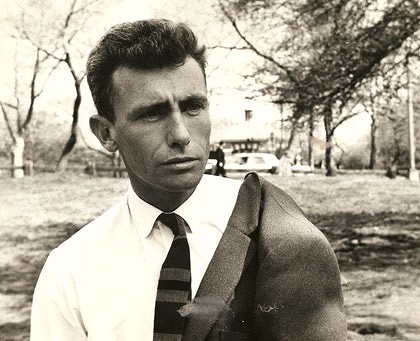 In researching speakers and material for the NSW Writers’ Centre event Honouring: Randolph Stow I had the pleasure of not only re-connecting with Stow’s work but also discovering that he was not the person I had thought him to be.
In researching speakers and material for the NSW Writers’ Centre event Honouring: Randolph Stow I had the pleasure of not only re-connecting with Stow’s work but also discovering that he was not the person I had thought him to be.
In 2014, the NSWWC introduced a new series of events, Honouring Australian Writers, to pay tribute to and reconnect people with Australian writers of importance who may have slipped from view. The first writer we focused on was Thea Astley. In researching Astley I quickly came across people with personal and professional connections to her. I approached Mark Macleod as I’d read a fleeting reference to him as an editor of her work. It turned out that his connection was much deeper than that – he had been her student and colleague, and became a very close family friend. Through Mark and with the help of others I was able to contact Astley’s son, Ed Wright, who opened the event. The event, by coincidence was ten years after Astley’s death, and scheduled for two days after her birthday. After the panel discussion, audience members spoke of fond and some very funny memories of Astley. This all made it a very personal occasion, so that it felt more like a memorial.
When we turned to Stow for the second event in the series, I remember saying that it would be a very different experience as I didn’t think there would be family or personal connections. My uninformed understanding of Stow was that he was a curmudgeonly alcoholic recluse who had abandoned Australia for a cold, damp town in England cutting off all ties with Australia. I thought he had died long ago and that there would be very few personal connections to be drawn upon.
I was so wrong. Instead, I have been struck by the warmth of people’s connections to Stow, the many kindnesses, and long maintained friendships. He was a man of few public words (outside of his work) but not a mean spirited man. He only died in 2010, but because he moved to England and withdrew from public life, our connection to him seems much more distant. But, of course, the public persona can be so different from the private person. Stow has an extensive family, a large network of friends and dedicated colleagues and many admirers amongst contemporary Australian writers (Tim Winton, Drusilla Modjeska, Christos Tsiolkas, Rachel Ward, and Omar Musa to name a few).
Among the many things I didn’t know about him is that the name by which we know him, Randolph Stow, was not his birth name (he was born Julian Randolph Stow) nor was it the name he was known by family and friends, they knew him as Mick Stow. He was so much more accomplished than I realised. Although best known for his novel Merry-Go-Round In the Sea (Macdonald, 1965), he was first recognised for his poetry, winning the Australian Literature Society Gold Medal for his first collection, Act One. He had two novels and a collection of poetry accepted for publication before he finished his undergraduate degree at the University of Western Australia. He also wrote a very well known children’s novel, Midnite: The Story of a Wild Colonial Boy (Penguin, 1967), short stories, reviews, and the libretto for two operas.
Before settling in England, he led a very nomadic and even adventurous life. To The Islands, published in 1958 and awarded the Miles Franklin, Melbourne Book Fair Award and his second Australian Literature Society Gold Medal, is based on his three months working as a volunteer at the Forest River Mission, an aboriginal mission in WA. When he was there he gained great respect for learning the local language. After completing his undergraduate degree, he studied anthropology at the University of Sydney. He used these skills as an assistant to the government anthropologist in New Guinea. Visitants is based on his experience in New Guinea.
There are a number of exciting developments in the recognition of Stow’s work. This year Text Publishing is republishing To The Islands, Tourmaline, Visitants, Suburbs of Hell, and The Girl Green as Elderflower with introductions by Australian authors such as Michelle de Kretser, Gabrielle Carey and Drusilla Modjeska. Suzanne Falkiner’s biography Mick: A Life of Randolph Stow will be published by University of Western Australia Press in early 2016. Westerly Magazine, Issue 60.1, will feature photography from Stow compiled in an essay by Kate Rendell.
I have compiled a collection of the articles, programs, and books that I came across in preparing for Honouring: Randolph Stow. This is by no means a comprehensive or even academic collection of information about Stow. It’s just a collection of the materials I came across that I thought would assist people in discovering more about this great Australian writer.
Julia Tsalis, Program Manager, NSW Writers’ Centre
For a timeline of Stow’s life, click here.
For links to articles about Randolph Stow, click here.
To read more about the Honouring Randolph Stow event, click here.
The Honouring Australian Writers series is made possible with support from the Copyright Agency Cultural Fund and the State Library of NSW.


